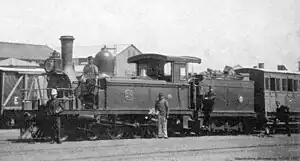1880 in South Africa
The following lists events that happened during 1880 in South Africa.
| |||||||||
| Decades: |
| ||||||||
|---|---|---|---|---|---|---|---|---|---|
| See also: | |||||||||
Incumbents
- Governor of the Cape of Good Hope and High Commissioner for Southern Africa: John Gordon Sprigg.
- Lieutenant-governor of the Colony of Natal: Henry Ernest Gascoyne Bulwer.
- State President of the Orange Free State: Jan Brand.
- State President of the South African Republic: Triumviate of Paul Kruger, Marthinus Wessel Pretorius and Piet Joubert.
- Lieutenant-Governor of Griqualand West: James Rose Innes (until 15 October).
- Prime Minister of the Cape of Good Hope: John Gordon Sprigg.
Events
- March
- April
- 23 – Eugénie de Montijo, wife of Emperor Napoleon III of France, arrives in Durban to visit the grave of her son, Napoléon Eugène, Prince Imperial, who was killed in Zululand during the Anglo-Zulu War in 1879.
- June
- 15 – The Natal South Coast railway line from Durban is opened to traffic to Isipingo.
- August
- British Governor Bartle Frere is recalled to London to face charges of misconduct.
- September
- Cape Prime Minister Gordon Sprigg's attempt at disarming the Basotho ignites the Basuto Gun War.
- October
- 18 – Griqualand West is annexed to the Cape Colony.
- December
- 16 – Britain declares war against the South African Republic and starts the first Boer War.
- Unknown date
- Britain forms the first Legislative Council in the Transvaal.
- The Afrikander Bond is established.
- The Transvaal declares itself the South African Republic again.
- The John N Gamewell, a small American brigantine, sinks off the west coast of the Cape Colony near Port Elizabeth.
- The Muizenberg Flyer, a faster suburban passenger train service, is introduced in Cape Town.[1]
Births
- Cecilia Makiwane, first black woman to become a professional nurse in South Africa.
- 23 December - John Hewitt, zoologist and archaeologist (d. 1961)
Deaths
Railways
Railway lines opened
- 1 February – Natal – Rossburgh to Isipingo, 6 miles 27 chains (10.2 kilometres).[2]
- 5 February – Cape Western – Fraserburg Road to Beaufort West, 48 miles 45 chains (78.2 kilometres).[3]
- 2 March – Cape Midland – Middleton to Cookhouse, 17 miles (27.4 kilometres).[3]
- 5 May – Cape Eastern – Cathcart to Queenstown, 45 miles 2 chains (72.5 kilometres).[3]
- 1 December – Natal – Botha's Hill to Pietermaritzburg, 41 miles 9 chains (66.2 kilometres).[2][4]
Locomotives
- The Cape Government Railways places the first nine of eighteen 4th Class 4-6-0 tank-and-tender locomotives in mainline service on its Midland System working out of Port Elizabeth and Eastern System working out of East London.[5][6]
- The Natal Government Railways places a Class K 0-6-0 saddle-tank locomotive in service.[7][8]
References
- MetroRail History
- Statement Showing, in Chronological Order, the Date of Opening and the Mileage of Each Section of Railway, Statement No. 19, p. 182, ref. no. 200954-13
- Report for year ending 31 December 1909, "Cape Government Railways, Section VIII - Dates of Opening and the Length of the different Sections in the Cape Colony, from the Year 1873 to 31st December, 1909."
- The South African Railways - Historical Survey. Editor George Hart, Publisher Bill Hart, Sponsored by Dorbyl Ltd., Published c. 1978, p. 16.
- Holland, D.F. (1971). Steam Locomotives of the South African Railways. Vol. 1: 1859–1910 (1st ed.). Newton Abbott, England: David & Charles. pp. 32–34. ISBN 978-0-7153-5382-0.
- C.G.R. Numbering Revised, Article by Dave Littley, SA Rail May–June 1993, pp. 94–95.
- Holland, D. F. (1972). Steam Locomotives of the South African Railways. Vol. 2: 1910-1955 (1st ed.). Newton Abbott, England: David & Charles. pp. 126–127. ISBN 978-0-7153-5427-8.
- NGR Class K of 1879, John Milne & no. 15
This article is issued from Wikipedia. The text is licensed under Creative Commons - Attribution - Sharealike. Additional terms may apply for the media files.

.jpg.webp)